
Attract Customers to Your Community with Content
The author's views are entirely their own (excluding the unlikely event of hypnosis) and may not always reflect the views of Moz.
Everybody’s talking about content. And everybody’s writing content. SEOs, social media specialists, agencies, marketing departments, probably even your mom. And a lot of it isn’t pretty.
Hopefully, by now, you got the memo that if you want your content to grow your business, it can’t be crap.
And hopefully you’re ready to do something about it.
There is a very tiny (yet very significant) theme — a shift in perspective — that is important to embody when you’re generating content for your website, blog, and social media outlets (oh, and offline, too):
It’s not about you.
It’s just not.
Even though you may be one of your company’s biggest fans, you are not your target audience. If you want to attract customers to your brand and your community, your content needs to reflect the fact that you understand your customer. That you’ve actually thought about and considered the challenges they face which make your product or service a necessity in their lives.
And you need to do all that without making it about you.
Try using foundational and community building content
In general, there are two types of content that you need on your website; we call them foundational content and community building content.
Foundational content is the important stuff that permanently lives on your website. It’s the inherently self-promotional stuff that explains who you are and what you do. It’s your about page, your sales pages (products or services), and it tends to be (but isn’t always) pretty static. Foundational content is the stuff that’s pretty much impossible not to make about you because it is, in fact, about you. As a result, in order to attract customers to your community with your foundational content, you’ve got to pack it full of value.
Community building content is less about what you do and more about what you know. It usually lives on your blog, is dynamic, and indirectly promotes your brand (and earns links). It’s what bolsters your online reputation as an expert. It builds trust, establishes credibility, and naturally attracts people to you. Community building content is most effective when it’s not self-promotional. It doesn’t need to say your company name. Instead, it needs to be completely focused on your customer and the value that you can provide or point them towards.
Patagonia is a really great example of providing value in both types of content. Whether it’s foundational or community building, they focus on the customer, their needs, and the experience. Let's take a look at some examples.
Packing value into foundational content
In Patagonia's foundational content, they focus their message not just on how cool their product looks or even how functional it is (though they don’t hide those things), but also on the broader concerns of their target audience.
This is an email marketing promotion that my husband just recently received about the Encapsil Parka:
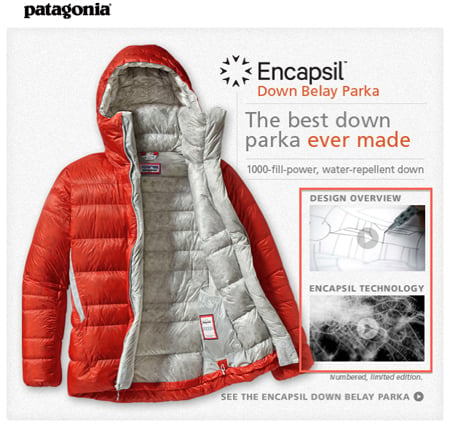
Notice how instead of just bragging about the fact that this is the best down parka ever made (all about them), Patagonia is also going to show you what they mean by providing value through video (all about the customer).
If you click through to the video, the content boasts “how little is used” to make the jacket, something that is important to consumers who respect (and are drawn to) the Patagonia brand. Patagonia is balancing self-promotion with something that is useful and enhances the experience.
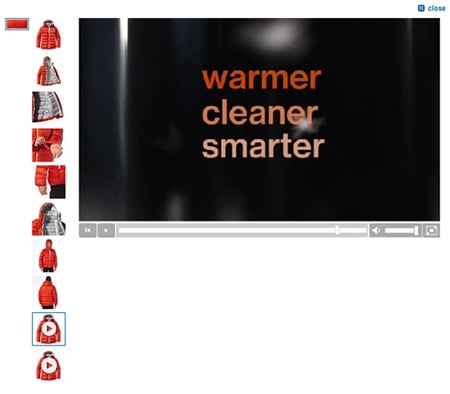
Even though Patagonia’s intention is to sell this product, they are committed to integrating value into their foundational content so that they are serving their customer. The page is also packed with additional videos, details, social proof, customer testimonials, and the opportunity to live chat. All. Kinds. Of. Value.
What community building content looks like
About a week later, my husband also received this email from Patagonia:
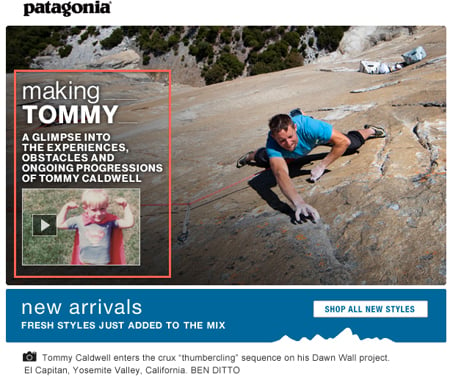
This is Tommy. He climbs rocks for a living. He’s a Patagonia Ambassador (that’s code for bad-ass-rock-climber).
This email marketing promotion clicks through to a post on the Patagonia blog about Tommy. Even though it lives on the Patagonia blog, it doesn’t plug Patagonia products, it doesn’t even link to any associated Patagonia rock climbing gear. It’s all about Tommy, his (kind of scary) adventures, and his drive to be a standup guy.
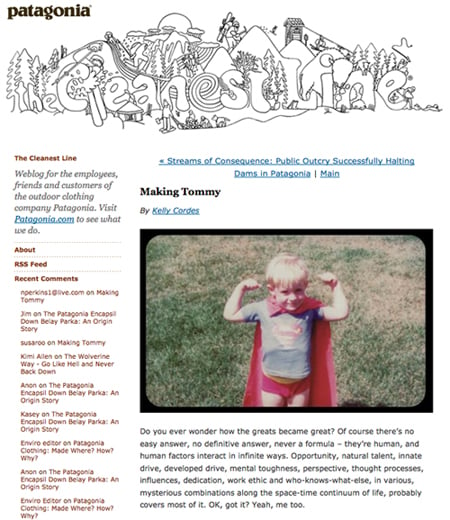
This is community building content (and it probably attracts a lot of links, too). It’s indirectly self-promotional. It speaks to the kind of people that Patagonia wants to attract to their community. My guess (and presumably Patagonia’s guess, too) is that people who like guys like Tommy resonate with what Patagonia stands for as a company and they want to be a part of what they’re doing (which means buy their products and join their community).
You can do this with a content strategy
You don’t have to be a ginormous brand like Patagonia to generate the kinds of content that will attract customers to your community. You just need to have a content strategy that will get you from where you are to where you’d like to be.
An ideal content strategy aligns the goals of your business with the expectations of your target audience. If you want to build a thriving community around your company, you’ve got to have a strategy that considers the people who are going to be reading your content and the experience that you want them to have.
The best place to start is with a content audit of your existing content. If you want to attract people to your community with your content, you’ve got to make it worth reading. That means over the first several months (and possibly beyond) you’re going to need to spend some time transforming what exists: improve what’s worth revising and ditch the rest.
Re-working your foundational content
When you’re auditing your foundational content, pay attention to whether it has any value or if it’s all about you. Certainly your content is going to be self-promotional (it is, after all, your website), but you can communicate what you do or sell and still be focused on the customer and their experience.
Even with your ‘about’ or ‘policy’ pages, you can use creative ways to improve the experience and add more value. You should also put some thought into the following:
-
Your why
Have you figured out your why yet? Focus on your passion and what makes you unique in your space. Why are you different from your competition? What is it that you like to do? Get very clear about what you do well and why and then make that what you’re all about.
-
Your customer
Who exactly are you targeting (remember, the whole world is not your customer)? Develop a persona around them. Get to know your semi-fictional audience members and keep them in mind as you manipulate your content.
-
Their challenges
What challenges does your audience have? Define their pain points and then make sure your content addresses them.
-
Where they’re coming from
At what level in the conversion funnel might your customer be visiting this page? In order to provide the best experience possible, your content should reflect this.
Balance the ‘all about me’ in your foundational content with the value that better serves your customer. Instead of having a page with a couple paragraphs of text and some bullets like this:
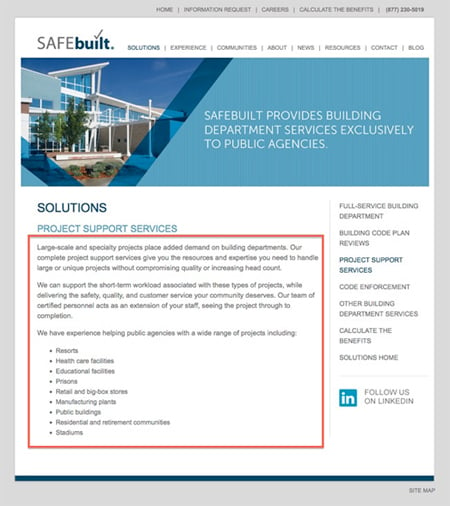
Supplement the textual information with things like video, blog posts, case studies, infographics, and testimonials:
Making these simple changes can make a big difference in your lift:

Integrating value into your foundational content is really about two things:
-
Satisfying user intent
The purpose of your foundational content is to convert. If you don’t provide anything but a couple paragraphs that give your 30 second elevator speech, you’ve just lost the opportunity for a sale.
-
User experience
Making sure that you’re providing the best user experience and that it’s consistent across your website, blog, and social media outlets, as well as your offline efforts.
The more value you provide with your foundational content, the more desirable you become, the more trust you build, the more you appeal to the person who is on the other side of that search. Again, anything that is going to make it less about you and more about them.
The key is to balance all of your foundational content with some community building content and then you’ve won the internet.
The angle on community building content
First things first. Just because you have a blog, doesn’t mean you always have to write about the stuff you sell (remember the 80/20 rule?). Same goes for your social media outlets. That gets old quick and can be pretty limiting in terms of the audience you can engage. It’s ok to promote your products or services on your blog, but work to keep that to 20% of the time.
Focus on developing community building content on your blog. It's the powerhouse that can help you reach the objectives you have for your business, and also attract (the right) customers to your community. But again, same thing applies: lay off the self-promotion.
Community building content can be blog posts like this one from SimpliSafe or infographics like this one that SEOgadget lovingly created for one of their clients:
Community building content can also be video like these tech product updates from Grovo:
...or even more in-depth resources like this simple and free e-book from Portent or these guides from Pippen's Plugins.
The bottom line with your community building content is that the focus needs to be on your customer. It's not meant to directly promote your company. You want to generate content that indirectly communicates your strengths and illustrates your expertise and knowledge. If your customers can find alignment with what they're searching for and the content you're providing, chances are, they will be more inclined to not only be part of your community, but also purchase your products and services.
Before you write your community building content, consider things like:
-
The goals of your (potential) customer
You know what your goals are for your business, but what about the goals of your target audience? What are their intentions with your content?
-
Depth in your content
What can you help them learn or better understand? Can you change their mind about an industry misconception or challenge their beliefs on a particular subject?
-
Satisfying a need
How can you serve their needs? Can you provide advice, ideas, instructions, suggestions, a guide? Your goal is to focus on providing quality content that that people really want (and are searching for).
As you’re creating community building content, consider following the 70/20/10 principle like Ian Lurie, Tom Cruise, and the dude from Coke do.
The basic gist is within your content strategy should look like this: 70% of your content should be a mix of mainstream stuff (knowledge, advice, and how-to type content); 20% goes along the same lines as the 70%, but with a little risk taking (controversial or attempting to attract a new audience); and 10% is the super cool stuff that may completely bomb but showcases your innovative side.
The thing about this approach is that it will help you to challenge the direction of your community building content so that you avoid just creating the same kind of stuff over and over (which will provide a more exciting experience for your users). It will both satisfy your existing customers and community members and attract new people who resonate with what you’re putting out there.
Even more importantly, the 70/20/10 principle will push who you are as a company which is really important when you're growing a community. Your community building content needs to make a statement about your brand, showing your community what you’re capable of and what you believe in. All stuff that will attract them to you (and keep them there).
Some final pointers
A couple (ok, three) more things to keep in mind:
-
There is no magic formula
It’s really important to have a content strategy that will assist you in working toward goals for your business. And it’s also really important that you create an execution plan that will help translate all of the stuff you want to accomplish into actionable, chewable pieces. But keep in mind that there is no magic number of posts that will attract customers to your business and your community. It’s the quality of your business, your content, and you.
As you work to develop strong content, keep in mind that this is an ongoing process that involves constant iteration. Don’t plan an execution calendar for any longer than a few months. Let your strategy drive, but listen to your content. Allow the freedom to be agile and change course based on what happens when your content is actually released.
-
Bring it back to your goals
Allow your content to take you on unexpected journeys. Be open to new ideas, consider the feedback you’re getting in blog comments and from people who provide input in real life. If a topic in your strategy suddenly becomes urgent, move it up in your execution plan. Be flexible. Just always make sure that you bring it back to your goals. When you ensure that your content is always in alignment with your business objectives and what your customers need, you’re clearing the noise. You’re staying focused on producing what’s important which helps to reduce anxiety, workload, and keeps you on track.
-
Good content is an investment in your business
Quality content is an asset that builds value in your business. Whether it’s a blog post, guide, whitepaper, case study, infographic, or video, your content is going to attract people to your business and your community (ongoing).
Creating content that’s valuable is not always a quick and easy task. Whether you’re committing to this for your own business or you’re an agency assisting a client with content, it’s going to take some time.
Start small. We’ve found with our clients that committing to two small (quality) posts a month is a realistic frequency (but it really depends on your goals and your strategy). If you’re developing content that’s more extensive like an in-depth guide or an infographic, reduce the frequency that month. Instead of spreading yourself thin on two, put all of your energy into one heavy hitter and give it the attention it deserves. After all, it’s an investment in your business.
Your content is meant to serve a purpose
Building and growing a community around your business can be done with an investment in a good strategy, content, outreach, and a lot of hard work. But keep in mind that your content isn’t just meant to rank, it’s intended to serve a purpose. Draw people in with your community building content, and then pack your foundational content so full of value that making the sale is the natural next step.
What interesting ways are you integrating value into your content, or have you seen other companies doing? I’d love for you to share your experiences in the comments below.

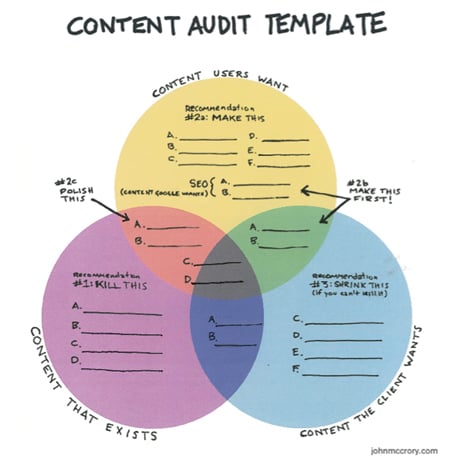
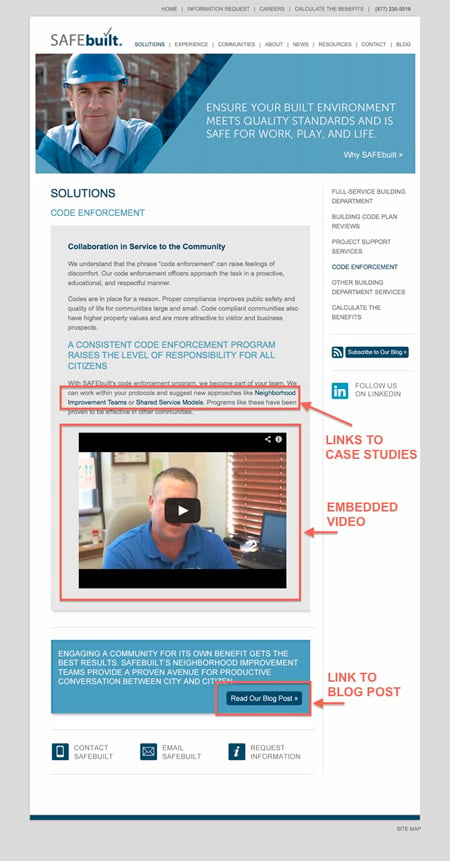
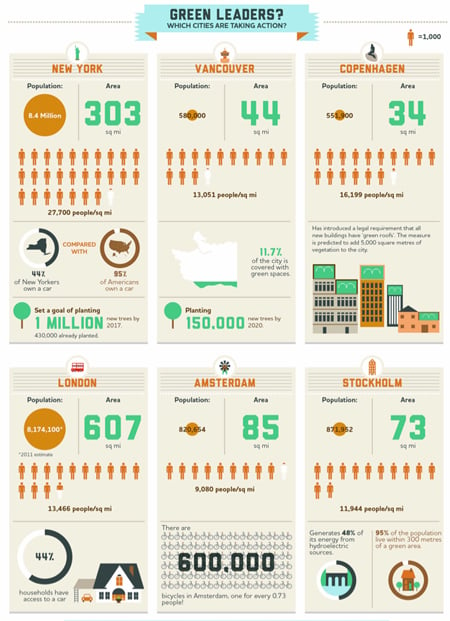
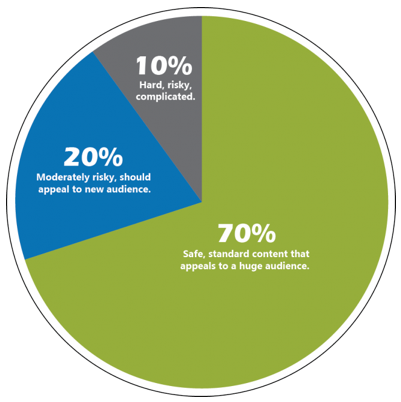



Comments
Please keep your comments TAGFEE by following the community etiquette
Comments are closed. Got a burning question? Head to our Q&A section to start a new conversation.